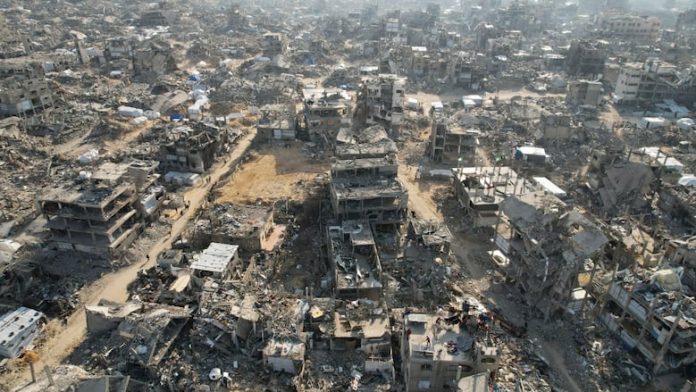Facebook Twitter Instagram Somali Magazine - People's Magazine
A joint report by the World Bank, United Nations (UN), and European Union (EU) estimates that rebuilding the Gaza Strip will require $53.2 billion over the next decade. The assessment underscores the severe economic toll of Israel’s war on the Palestinian enclave and the urgent need for recovery and reconstruction efforts.
Titled “Gaza and West Bank Interim Rapid Damage and Needs Assessment (IRDNA),” the report details the widespread devastation across nearly all sectors of the Palestinian economy. It highlights that damages to physical structures alone are estimated at approximately $30 billion. Housing is the hardest-hit sector, accounting for 53% of total destruction, followed by commerce and industry, which comprise 20% of the total damages.
Beyond the physical destruction, economic losses are estimated at $19 billion due to reduced productivity, lost revenues, and escalating operational costs. The sectors most affected include health, education, and commerce. The report also points out that nearly all economic activity in Gaza has come to a halt, with prices soaring by more than 300% within a year. Food prices alone have surged by 450%, exacerbating the humanitarian crisis.
The Gaza economy is projected to shrink by a staggering 83% in 2024, reducing its contribution to the Palestinian economy to a mere 3%, despite the enclave being home to 40% of the Palestinian population. The economic strain is also felt in the West Bank, where the economy is expected to contract by 16% this year due to heightened restrictions and instability.
A ceasefire agreement between Israeli forces and Palestinian resistance factions took effect on January 19, bringing a temporary halt to the hostilities that have claimed the lives of nearly 48,300 Palestinians, most of them women and children. However, the war has left Gaza in ruins, and the path to recovery remains uncertain.
Last November, the International Criminal Court (ICC) issued arrest warrants for Israeli Prime Minister Benjamin Netanyahu and former Defense Minister Yoav Gallant for alleged war crimes and crimes against humanity in Gaza. Additionally, Israel faces a genocide case at the International Court of Justice (ICJ) over its military actions in the enclave.
Amid these developments, former U.S. President Donald Trump has proposed a controversial plan to “take over” Gaza and resettle its Palestinian inhabitants. He envisions turning the war-torn strip into what he calls “the Riviera of the Middle East.” However, this idea has been widely condemned by Palestinians, Arab nations, and many Western governments, who argue that it amounts to ethnic cleansing.
Egypt has countered Trump’s proposal by unveiling its own comprehensive plan to rebuild Gaza without displacing its residents. Cairo is set to host an emergency Arab summit on March 4 to discuss the initiative, aiming to coordinate a collective response to the reconstruction efforts. Meanwhile, Arab leaders will convene in Riyadh on February 20 to formulate a unified stance against Trump’s plan and deliberate on broader strategies for Palestinian recovery.
As Gaza grapples with the aftermath of war, the international community faces mounting pressure to mobilize resources and develop a long-term reconstruction framework. The challenge ahead is not just about rebuilding infrastructure but also ensuring the economic and social stability of millions of Palestinians affected by the war.

